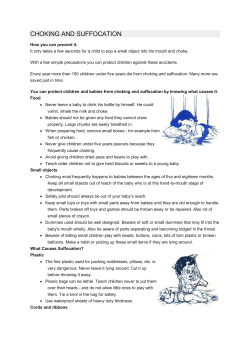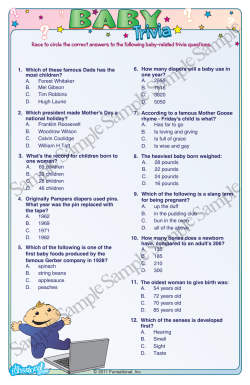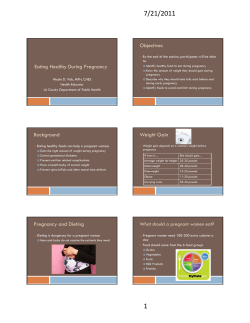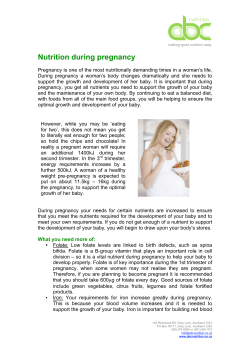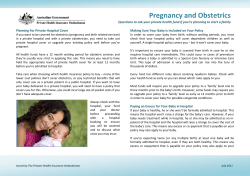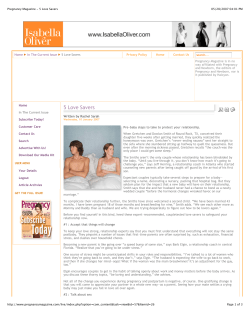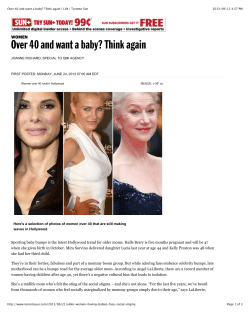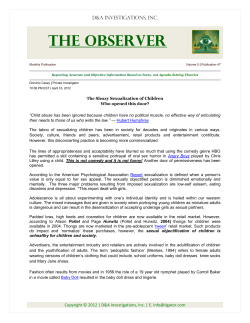
Baby’s foods first
Baby’s Local Contact first foods This information, along with other child health information, is available in electronic format at www.healthywa.wa.gov.au This document can be made available in alternative formats on request for a person with a disability. Please contact childcommunity@health.wa.gov.au Disclaimer © Child and Adolescent Health Service, Department of Health, 2011 Revised August 2013 CAH-003055 SEPT'13 The advice and information contained herein is provided in good faith as a public service. However the accuracy of any statements made is not guaranteed and it is the responsibility of readers to make their own enquiries as to the accuracy, currency and appropriateness of any information or advice provided. Liability for any act or omission occurring in reliance on this document or for any loss, damage or injury occurring as a consequence of such act or omission is expressly disclaimed. The right start... a guide to the best foods for your baby. Getting started... B At first... reast milk is the best food for your baby. It provides all the nutrients your baby needs for the first six months of life, and is an important food for the first year. If you are not breastfeeding, use an infant formula. Your baby may not be too sure about solid foods – more may end up on the floor than in your baby’s mouth. But in time, especially if you are patient and relaxed, your baby will learn to eat and enjoy a wide range of family foods. At around six months of age, babies will need more nutrients than can be provided by breast milk or infant formula and will be ready for solid food. Your baby’s first attempts at eating are important food experiences that help your child become familiar with food. At the start your baby will only eat small amounts so breast milk or formula is still the most important food at this time. By the end of the first year, your baby will have progressed from pureed or mashed foods to foods that are chopped into small pieces, and will be feeding himself/herself finger foods. Experts Say... Introducing solid food at the right time is very important. If you start too early, your baby’s digestive system is not ready for solid food. Starting solid food before your baby is four months old can increase the risk of allergies and rejection of the spoon. If you wait too long after six months, your baby will miss out on important nutrients needed for growth and development. It becomes harder for your baby to accept new tastes and textures and it can also increase the risk of developing allergies. When is the right time? A round six months of age most babies are ready to try new foods and textures, and ways of feeding. Try starting solids if your baby: Is about six months of age Can sit on your lap and hold his/her head steady S hows interest in food (e.g. reaches for food when you are eating) Takes pureed food from a spoon without pushing it out of the mouth with the tongue Looks for more food after a full breastfeed. Babies develop at different rates. The recommendations for introducing solids in this guide generally suit most babies. If you are experiencing problems or if you are unsure if your baby is ready for solid foods, contact your child health nurse, dietitian or doctor. Tips for success... Be relaxed! ake sure baby is sitting comfortably and M supported and is not too hungry, or too tired Use a soft plastic spoon, not a metal teaspoon If baby refuses first time, try again in a day or so Always stay with your baby when baby is eating S it your baby with the family at meal times to watch and learn Be prepared for a mess, it’s part of learning to eat. How do i start? In the first few weeks give your baby small amounts of pureed, soft foods from a soft spoon. Start with small tastes of food, say half a teaspoon, after a breastfeed. Don’t worry if your baby doesn’t swallow very much food in the beginning. Babies often refuse food or spit it out. Remember, every baby develops at their own pace. Some will learn to eat from a spoon quickly, others will have little interest. Don’t give up, just try again another time. The amounts suggested here are just a guide to help you get started. Your baby will take more solids at each feed as it gets used to food and continues to grow. Be aware that when different foods are introduced your baby’s poo will change in colour and texture. Don’t be alarmed, this is normal. Foods to try first The first foods to start at around six months are foods high in iron including iron-enriched cereals and other ironfortified or iron-containing foods such as pureed meat, poultry and fish, cooked tofu and legumes. Other than starting with iron-rich foods there is no particular order that foods should be introduced or the number of new foods that can be given at a time. Slow introduction of foods is not necessary. However, it is important that the texture is suitable for the baby’s development. Start with purees and then mashed foods, progressing to minced and chopped foods. Start with about a teaspoon of baby rice cereal made into a smooth paste with breast milk, infant formula or cooled, boiled water. Offer once or twice a day, after a breastfeed or formula feed. Gradually increase the amount over a couple of days until your baby is eating about one to two tablespoons at a time. As your baby gets used to solid food, increase the amount you offer at a feed. Foods from the five food groups that puree easily or have a pureed texture include: Any iron-fortified cereal, cooked, pureed meat or meat alternatives like: • Meat • Fish • Chicken • Pork • Tofu • Legumes/beans Try cooked pureed vegetables like: • Potato and sweet potato • Pumpkin • Carrot Try cooked pureed fruit like: • Apple • Pear • Peaches • Apricots Try other soft fruits like: • Banana • Avocado Preparing baby’s food S team or boil vegetables or fruits in a little water with no added salt or sugar. Cook meats, poultry, fish or meat alternatives in a little water with no added seasoning. Puree foods using a blender, or by mashing through a sieve to make sure there are no lumps. What about mercial combaby foods? F requent use of commercial baby foods is not recommended as it may lead to delayed chewing and poor acceptance of new tastes and textures. They can be used as a standby or when travelling, but they shouldn’t form the basis of your baby’s diet. Homemade food offers more variety in taste and texture and is cheaper than commercial baby food. Handy Hint Pre-prepared homemade foods can be stored in ice cube trays or small, sealed containers in the fridge or freezer. About allergies... B reast milk gives the best protection from allergies. For greatest protection do not give solids before four months, breastfeed for at least six months and while you are introducing foods, and for as long as you desire after that. Even if there are family members with food allergies, there is no need to delay the start of solid foods or certain types of foods in order to prevent allergies. Egg, peanuts and tree nut pastes , wheat, cow’s milk in cooking, fish, shellfish and sesame can be introduced from six months. Delaying or avoiding the introduction of these foods may increase the risk of your baby developing an allergy. A small number of babies are allergic to some foods. There are a number of different symptoms of food allergy or food intolerance, which can be similar to the symptoms of other childhood illnesses. Most symptoms of food allergy are mild or moderate and occur within 30 minutes of eating the food. These symptoms may include swelling of the face, eyes or lips, hives or welts, vomiting and diarrhoea, rashes or redness of the skin. If your baby shows signs of an allergic reaction to food, or if there is a strong family history of allergy (that is, if a parent or baby's sibling has an allergy), it may be wise to introduce foods one at a time, two or three days apart so you can detect any reactions. If you suspect your baby has had an allergic reaction to a food, you should avoid giving that food again and make an appointment to see your doctor. What to do if... My baby doesn’t like the new food… Don’t worry or give up, just offer the food another time. New foods may need to be offered up to 10 times before babies accept them. The food tastes bland… Try not to let your Babies are more sensitive to taste. own likes Food may taste bland to you, but your baby will enjoy the simple taste. and dislikes limit your There is no need to add salt, sugar baby’s or spices to your baby’s food. choices The weather is hot… Give your baby plenty of fluid in hot weather to prevent dehydration. You may need to breastfeed or offer infant formula more often. Cooled, boiled water is the only other drink recommended for babies who need extra fluid. Prevent Choking... Babies and young children are at risk of choking on foods that are: Small, hard, round, sticky. Popcorn, nuts, seeds, hard lollies and hard raw fruits and vegetables, and corn chips are not suitable for babies. Make sure you: Remove small bones and gristle from meat, fish or poultry Always watch carefully when your baby is eating Remove the skin from sausages, if offered Cook and mash hard fruit and vegetables (eg. peas, beans, carrots and apple) Check that small, round foods like grapes are well chewed. At about 8 months... B y about eight months your baby will be eating a variety of foods and trying thicker textures like soft lumps and minced foods. Even if babies have only a few teeth, they can chew mashed food and finely diced meats with their gums. Once your baby is eating a variety of foods you can offer solids before breast milk or formula. Around eight months of age, many babies like to feed themselves. It is a good time to give ‘finger foods’ that your baby can hold and chew. Try toast, bread and other finger foods such as steamed or roasted vegetable sticks, soft fruits, crackers and strips of cooked chicken, fish or meat. Encourage your baby to drink cool, boiled water from a cup at this age. Foods to move on to... Once babies are having different textures, most can eat minced or mashed food from the family menu. This may be messy, but it’s an important part of the learning process. Try introducing a greater variety of foods from the five food groups. Meat and meat alternatives Tender well-cooked meats: • Stews and casseroles • Diced or chopped meat and chicken Vegetables ieces of well-cooked P vegetables: • Carrot • Potato • Beans • Peas • Broccoli Fruit ieces of soft P chopped, raw fruit: • Banana • Melon • Lean mince • Fish without bones or batter • Tomato ieces of cooked P apple or pear • Eggs Well-cooked and mashed legumes: • Baked beans Milk, yoghurt, cheese • Lentils Breads and cereals Plain unsweetened breakfast cereals: • Porridge • Weet-Bix® • Vita Brits® Breads (including toast) Rice, Pasta ow’s milk should not be C given as a drink until your baby is 12 months old. However, small amounts of cow’s milk can be given as: • Yoghurt • Cheese • Custard • Milk with breakfast cereal Foods that are not suitable for your baby... x Do not add salt, sugar, butter or margarine to your baby’s foods. Your baby enjoys simple tastes. x The bacteria in honey can be harmful to babies. Honey is not recommended for children less than one year of age. x Whole nuts are not recommended for infants and young children because of the danger of choking. Nut pastes (eg. peanut paste) can be used from six months even if there is a previous family history of nut allergy. Drinks that are not suitable for your baby... x Cow’s milk and goat’s milk x Skim or low-fat milk x Soy beverage (except soy infant formula) and other plant based beverages (eg, rice, oat, coconut or almond) are not recommended as alternatives to breast milk or infant formula for the first 12 months as they are not nutritionally appropriate. x Follow-on formulas are not necessary. ruit juice may cause tooth decay and loss of x F appetite, stomach problems or runny poo, which may slow your baby’s growth and development. Juice is not recommended for babies under six months, and older infants should be encouraged to eat whole pieces of fruit rather than juice. For infants over six months of age, drinking cool, boiled water is a better choice than fruit juices and fruit drinks. x T ea, herbal teas, coffee, chocolate drinks, and cola drinks contain tannins and/or caffeine that are not suitable for children. Soft drinks or cordials are high in sugar. Intake x of these drinks has been linked to obesity and tooth decay. Energy drinks claim to have ‘energy enhancing x ingredients’ including vitamins, amino acids, caffeine/guarana in amounts that are not safe for children. Food Safety... B abies are at greater risk of serious illness from food poisoning. It is important to keep your baby’s food safe. Tips for keeping baby’s food safe: Always wash your hands before preparing food Always wash baby’s hands before he/she eats Use clean utensils and work surfaces lways use separate chopping boards and A utensils when preparing raw food and ready-to-eat foods ash all fruits and vegetables thoroughly W before preparing S tore prepared food in a sealed container in the fridge or freezer e-heat pre-prepared food thoroughly before R cooling it down to give your baby Never re-heat food more than once Keep pets away from food. Always wash your hands before preparing food Your community health nurse, doctor or… Dietitians Association of Australia Look for your local dietitian in the Yellow Pages. Accredited Practising Dietitian (APD) Hotline – Freecall 1800 812 942* www.daa.asn.au ✃ For more information… Feeding your baby: The first 12 months The first six months Breast milk or infant formula. Australasian Society of Clinical Immunology and Allergy www.allergy.org.au Ngala Helpline 8:00am– 8:00pm 7 days a week Telephone (08) 9368 9368 Outside metro area – Freecall 1800 111 546* www.ngala.com.au Parenting WA Line Freecall 1800 654 432* www.dlgc.wa.gov.au/parents Raising Children Network www.raisingchildren.net.au *Calls made from a mobile may be charged at a timed rate. Your baby will take enough milk to suit his/her needs. At first babies may feed between eight to twelve times in 24 hours. This will cut back to about six feeds as baby grows and takes more at each feed. Remember there might be times when your baby wants to feed more often. This can be a sign of a growth spurt. This often happens at about six weeks. Baby’s first solid foods should be smooth with no lumps. Try about a teaspoon after a breast or formula feed. Gradually increase the amount until your baby is eating one to two tablespoons. Your baby will be ready to try foods with a thicker texture. Mash or mince foods. Once your baby is eating a variety of foods you can offer a small meal before breast milk or formula. By 12 months your baby will be able to have the same foods as the rest of the family. Make sure you have a variety of nutritious foods and limit ‘sometimes’ foods such as take-away, chips, biscuits and cakes. Your baby will probably start with breast milk or formula when they first wake. Babies have small stomachs so they need about five small meals each day. Establish meals before introducing nutritious snacks. About six months Start solid foods (eg. iron fortified baby cereal). As long as iron-rich foods are offered first, foods can be introduced in any order. About eight months Babies often like to feed themselves around this time. Try finger foods like rusks, toast, pieces of cooked vegetable and banana. Nine to twelve months Your baby should be able to manage a variety of foods by now. Meal times can still be a messy business but this is all part of learning. Remember all babies are different and will have different appetites, use this table as a guide only. Consult your community health nurse or doctor if you are worried about feeding your baby.
© Copyright 2025

